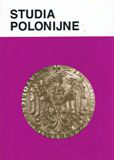Z historii katolickiej parafii w Baku w drugiej połowie XIX wieku
From the History of Catholic Parish in Baku in the Second Half of 19th Century
Author(s): Andrzej FurierSubject(s): Cultural Essay, Political Essay, Societal Essay
Published by: Towarzystwo Naukowe KUL & Katolicki Uniwersytet Lubelski Jana Pawła II
Summary/Abstract: Azerbaijan is a country with Islam as dominant religion. In the past, believers of other religions also lived there. In the first centuries AD a Christian Caucasian Albania existed in today’s bordering area of Azerbaijan and Dagestan. However, Christianity failed to take deeply root in the east of Transcaucasia, because of the strong influences of Zoroastrism and Islam brought in 7th century by the Arabs. The Catholic missions from 17th century on the Azerian territory were conducted by Jesuits, Carmelites and Dominicans. There was an moment, when the history of the Azeris and Poland met − one of the most known missioners was a Polish Jesuit, Tadeusz Krusiński. In 19th century the territory of Azerbaijan was taken by Russia, what changed the situation for the benefit of Christianity, mostly for Orthodox Church. However, also the first Catholic chapels were founded at garrisons, where soldiers of Polish nationality in the Russian army were stationed. When the number of Poles in the Russian army decreased, the authorities tried to take over these sanctuaries for the Orthodox Church’s needs. After the soldiers, also a civilian Polish community appeared in the late 19th century in Azerbaijan, and its most important centre was city of Baku – Poles formed the majority of Catholics in this city. Their efforts to build a Catholic church in Baku started very early, even in 40s of 19th century, but with no results. Tsarist bureaucracy very long refused to gave an permission − this article, based on sources from Central Historical Archive of the Republic of Azerbaijan, describes this struggle between Polish Catholic community and the office of Governor of Baku, presents also Catholic community's efforts to raise funds for building. Only in 1894 first provisional chapel were built, and in 1910 − the Parish Church of Immaculate Conception. This church was not only a religious, but also cultural and educational centre of Polish community in Baku. Unfortunately, the church existed only few years: after Bolshevik Revolution in 1917 and creation of the Azerbaijan Soviet Republic, the politics of militant atheism came. Most of Poles fled from Baku, all property of Parish (together with buildings) was confiscated, and the clergy was persecuted. The builder of church, priest Stefan Demurow, was arrested in 1937 and probably executed on Moscow.
Journal: Studia Polonijne
- Issue Year: 2008
- Issue No: 29
- Page Range: 263-281
- Page Count: 19
- Language: Polish

